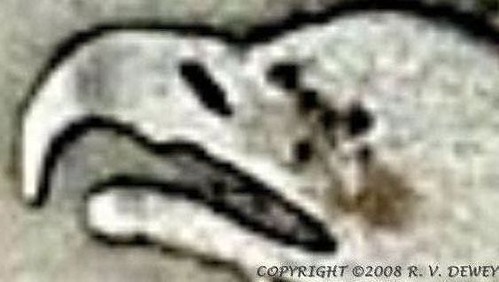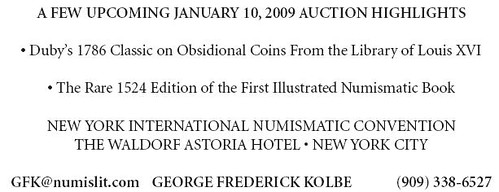
PREV ARTICLE
NEXT ARTICLE
FULL ISSUE
PREV FULL ISSUE
V11 2008 INDEX
E-SYLUM ARCHIVE
DID LONGACRE HIDE A WITCH IN HIS FLYING EAGLE DESIGN?
R.V. Dewey has been sharing with us some of his close-up
images of coins showing what he believes could be hidden designs placed
there by engravers. Just in time for Halloween week, R.V. submitted the
following image of a coin he calls Witch Eye(TM). Could it be a witch?
-Editor

R.V. writes:
The accompanying copyrighted, close-up photograph is the
.bald. head and beak area of an 1855 Flying Eagle Large Cent pattern. You
can easily judge the magnification; the coin is basically the size of a
large cent, only a tad smaller!
There is inexplicably no engraved detail visible on the entire head area of this .Proof. coin except for our cauldron girl, the .Witch!. The quintessential cartoon Witch: (large floppy hat, big nose and an overly exaggerated pointed chin), occupies the eye/head area and gazes forever to the East, thanks to Mr. J. B. Longacre.s macabre sense of humor. Stack.s considered this coin .rare. as struck surfaces, at the January 2007 Americana Sale. This coin is a slabbed J-171A Proof with noted Environmental Damage. For the record, I have never had this coin in a raw, unslabbed, state.
Within this very decade experts might have mistakenly proclaimed this coin a crude copy in the wrong alloy, or a spotted counterfeit of dubious origin. We have come a long way in just a few short years, expanding our knowledge of .real. patterns, but there is still a long, uncharted road to travel!
The Judd 171A is a perfect example of a previously unknown pattern coin that appears from seemingly nowhere. The existence of this German silver coin was only speculation and unrecorded for over 150 years. Even though we knew the Mint never used German silver for 1855 Flyers, this coin is indeed the real McCoy and certified as such! Apparently what we thought we knew for 150 years was proven totally inaccurate by the certification of several Judd 171A.s
In 1855, Mr. James Barton Longacre assembled for presentation and the Mint .cabinet,. extremely rare sets of eight pattern coins per set - one coin supposedly of each alloy. Who knew that German silver was one of J.B.L..s original eight alloys in 1855? No one! Each coin was hand engraved with an identifying Roman numeral.
The last recording of a Roman numeral engraved 1855 Flying Eagle Pattern Cent was, according to my research, over 100 years ago! Sadly, for numismatic historians, all contemporary pattern books have inexplicably omitted any mention of J.B.L..s rare Roman numeral Flying Eagle pattern sets. Are they all gone or just forgotten?
We know for a fact from Dr. Judd.s 5th Edition that these Extremely Rare Roman numeral eight piece sets did indeed exist! Who, among us, has the right to delete known numismatic history, verified in print, by the late Dr. J. Hewitt Judd M.D.? We must all answer in unison, .No One.!
Having two of Mr. Longacre.s Roman numeral 1855 Flying Eagle Patterns: numbers I and IIII; this glaring omission from all the pattern books, I find a little more than recondite! Witch Eye(TM) is Roman numeral .IIII. from Mr. J. B. Longacre.s long forgotten and extremely rare, complete eight piece, Mint sets.
There is inexplicably no engraved detail visible on the entire head area of this .Proof. coin except for our cauldron girl, the .Witch!. The quintessential cartoon Witch: (large floppy hat, big nose and an overly exaggerated pointed chin), occupies the eye/head area and gazes forever to the East, thanks to Mr. J. B. Longacre.s macabre sense of humor. Stack.s considered this coin .rare. as struck surfaces, at the January 2007 Americana Sale. This coin is a slabbed J-171A Proof with noted Environmental Damage. For the record, I have never had this coin in a raw, unslabbed, state.
Within this very decade experts might have mistakenly proclaimed this coin a crude copy in the wrong alloy, or a spotted counterfeit of dubious origin. We have come a long way in just a few short years, expanding our knowledge of .real. patterns, but there is still a long, uncharted road to travel!
The Judd 171A is a perfect example of a previously unknown pattern coin that appears from seemingly nowhere. The existence of this German silver coin was only speculation and unrecorded for over 150 years. Even though we knew the Mint never used German silver for 1855 Flyers, this coin is indeed the real McCoy and certified as such! Apparently what we thought we knew for 150 years was proven totally inaccurate by the certification of several Judd 171A.s
In 1855, Mr. James Barton Longacre assembled for presentation and the Mint .cabinet,. extremely rare sets of eight pattern coins per set - one coin supposedly of each alloy. Who knew that German silver was one of J.B.L..s original eight alloys in 1855? No one! Each coin was hand engraved with an identifying Roman numeral.
The last recording of a Roman numeral engraved 1855 Flying Eagle Pattern Cent was, according to my research, over 100 years ago! Sadly, for numismatic historians, all contemporary pattern books have inexplicably omitted any mention of J.B.L..s rare Roman numeral Flying Eagle pattern sets. Are they all gone or just forgotten?
We know for a fact from Dr. Judd.s 5th Edition that these Extremely Rare Roman numeral eight piece sets did indeed exist! Who, among us, has the right to delete known numismatic history, verified in print, by the late Dr. J. Hewitt Judd M.D.? We must all answer in unison, .No One.!
Having two of Mr. Longacre.s Roman numeral 1855 Flying Eagle Patterns: numbers I and IIII; this glaring omission from all the pattern books, I find a little more than recondite! Witch Eye(TM) is Roman numeral .IIII. from Mr. J. B. Longacre.s long forgotten and extremely rare, complete eight piece, Mint sets.
Earlier editions of Judd did refer to the Roman-numeraled
sets. R.V. first raised this question at the beginning of 2007, but I
don't think we had any responses. -Editor
R.V. adds this note, from The Comprehensive Catalogue & Encyclopedia of U. S. Coins, 1976, by Don Taxay (p198):
In 1855, the Mint distributed a few complete sets of that
year.s pattern cents, identifying each one numerically by small Roman
numerals scratched into the obverse field.
To read R.V.'s earlier E-Sylum query, see: 1855 FLYING EAGLE PATTERN SET INFORMATION SOUGHT (http://www.coinbooks.org/esylum_v10n01a06.html)

By the way, at least one E-Sylum reader reports seeing the
same faces I did in the gold dollar photo published in the last issue. Joe
Boling writes:
I also see both faces in the 1856 gold dollar - the one
behind is whispering in the left ear (or nibbling on the ear) of the man
with the moustache. I saw the one behind last week, and the mustachioed
fellow this week.
-Editor 
Wayne Homren, Editor
The Numismatic Bibliomania Society is a non-profit organization promoting numismatic literature. See our web site at coinbooks.org.
To submit items for publication in The E-Sylum, write to the Editor at this address: whomren@gmail.com
To subscribe go to: https://my.binhost.com/lists/listinfo/esylum
All Rights Reserved.
NBS Home Page
Contact the NBS webmaster
